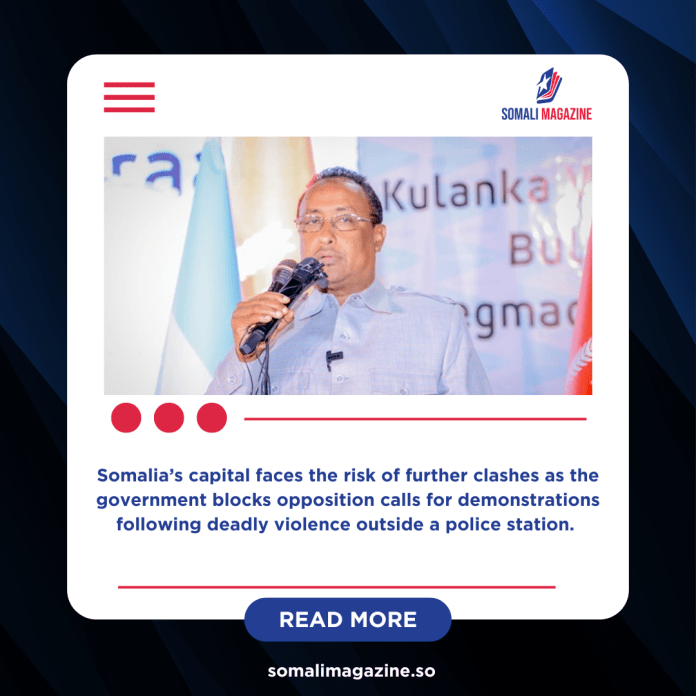Facebook Twitter (X) Instagram Somali Magazine - People's Magazine
Mogadishu Mayor Hassan Mohamed Hussein Muungaab announced on Thursday that opposition-organized protests in the capital would not be allowed unless cleared by his administration. His order came just a day after deadly clashes between opposition forces and police outside a district station, an incident that has sharply heightened political tensions.
Muungaab, who also serves as governor of the Banadir region, directed security forces to take firm legal action against anyone attempting to demonstrate without authorization. He accused opposition leaders of stirring unrest, insisting they had no authority to call for protests since they did not control any territory. “Citizens should not join them,” the mayor warned, adding that security agencies had been instructed to stop unauthorized gatherings.
His comments followed violent confrontations on Wednesday outside the Warta Nabadda District Police Station. Witnesses reported that guards for former President Sharif Sheikh Ahmed and other opposition figures clashed with federal forces after arriving near Mogadishu’s busy Sinai Market. Gunfire broke out between the two sides, leaving casualties among soldiers, opposition fighters, and civilians. Officials, however, did not release an official death toll or number of those injured.
The Somali federal government strongly condemned the attack, describing it as an armed attempt to seize the police station. In a statement, the Ministry of Information placed responsibility squarely on opposition politicians, accusing them of undermining state authority and threatening public order. “Responsibility for the events rests with those who brazenly violated the state’s authority, security, order, and laws,” the ministry said.
The clashes came shortly after the Somalia Salvation Forum, a coalition of opposition leaders, announced plans to take legal action against the administration of President Hassan Sheikh Mohamud. The Forum, which includes former president Sharif Sheikh Ahmed, ex–Prime Minister Hassan Ali Khaire, and lawmaker Abdirahman Abdishakur, accused the government of corruption, constitutional violations, and involvement in illegal land sales that displaced poor families from their homes.
Beyond legal challenges, the Forum has also been calling for mass mobilization. It has accused the federal government of neglecting the fight against al-Shabab in favor of consolidating political control. The group has warned that the country is entering what it called a “sensitive political and constitutional crisis.” Its leaders urged Somalis at home and abroad to stage peaceful protests against what they describe as abuse of authority and misuse of power.
Mayor Muungaab dismissed these calls, arguing that Mogadishu remains stable and secure. He accused opposition figures of attempting to destabilize the city under the guise of politics. “The opposition cannot declare protests in Tarabuunka, in Siinaay, or anywhere else,” he said, referencing key areas in the capital where demonstrations have often been staged in the past.
The mayor’s ban now sets the stage for a direct confrontation. Opposition groups have already announced plans for demonstrations this coming weekend, while federal authorities appear determined to block them from going ahead. With both sides standing firm, Mogadishu faces the prospect of further clashes, deepening a political rift at a time when Somalia is already struggling with insecurity, economic pressures, and the continuing threat of al-Shabab insurgents.
Observers warn that the standoff could further erode public confidence in both the government and opposition, especially if violence escalates. For now, residents of the capital are caught between rival political camps—one calling for public mobilization, the other threatening strict measures against dissent. How the situation unfolds in the coming days may determine whether Mogadishu sees another round of unrest or manages to pull back from the brink.

